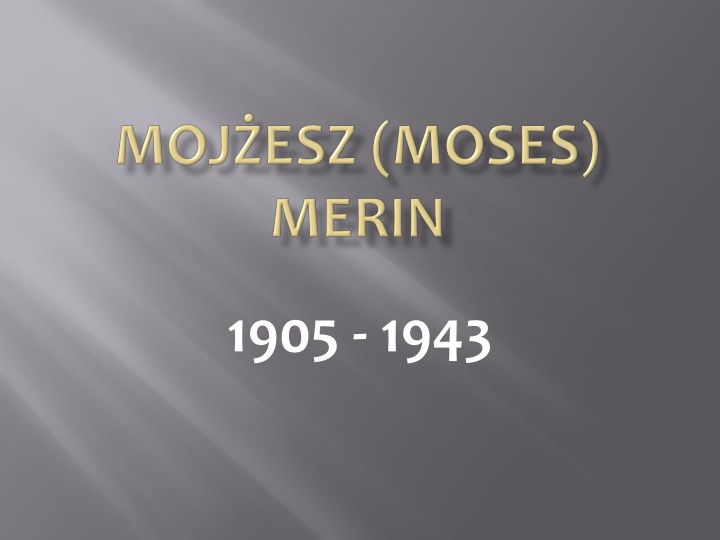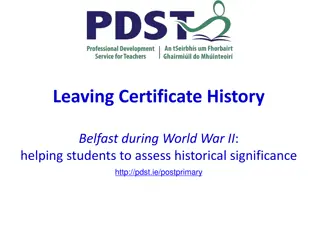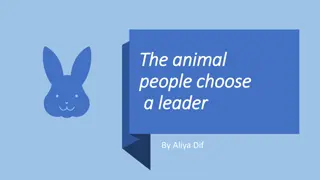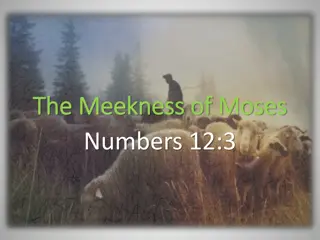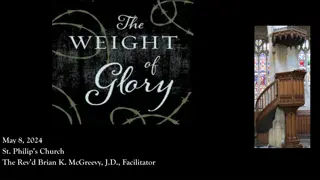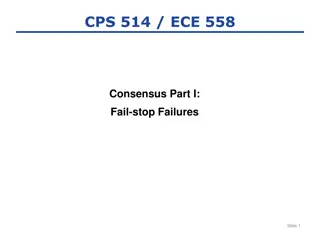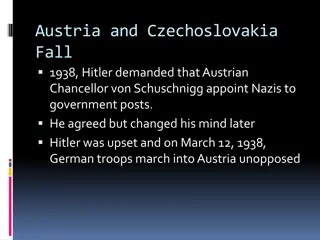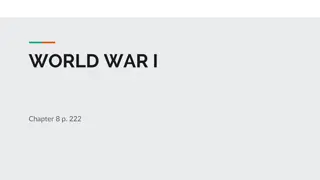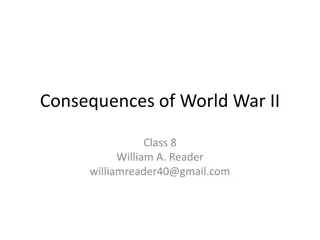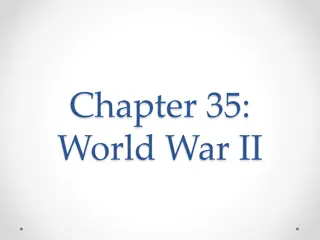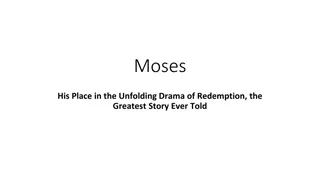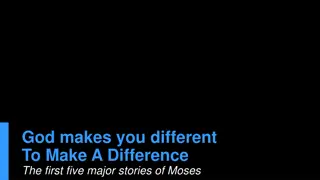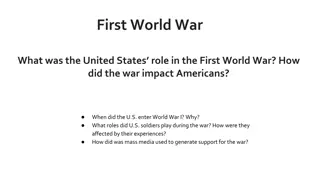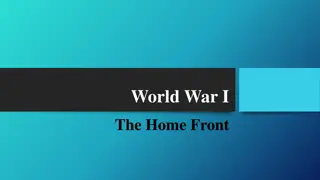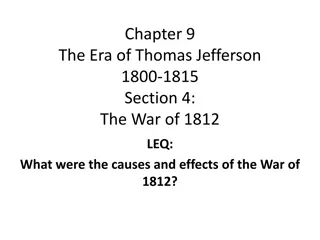Moses Merin: A Leader in Sosnowiec During World War II
Moses Merin, born in 1905 in Sosnowiec, was involved in the Jewish community before and during World War II. Despite his initial reluctance, he became the president of the Jewish community committee and later headed the Central Committee of Councils of Elders for East Upper Silesia. Merin's leadership played a crucial role in navigating the challenges imposed by the German occupation, including the establishment of Judenräte and managing deportations to extermination camps.
Download Presentation

Please find below an Image/Link to download the presentation.
The content on the website is provided AS IS for your information and personal use only. It may not be sold, licensed, or shared on other websites without obtaining consent from the author.If you encounter any issues during the download, it is possible that the publisher has removed the file from their server.
You are allowed to download the files provided on this website for personal or commercial use, subject to the condition that they are used lawfully. All files are the property of their respective owners.
The content on the website is provided AS IS for your information and personal use only. It may not be sold, licensed, or shared on other websites without obtaining consent from the author.
E N D
Presentation Transcript
Merin was born in 1905 in Sosnowiec. He came from a well- known family. Before the war he worked as a commercial broker. He separated from his wife and lead a bachelor s Because of his slight built he looked a few years younger than he actually was. He was pale, had brown hair and keen eyes. life.
He spent most of his time in coffeehouses playing cards and billiards and losing considerable sums of money. He was interested in politics, but in order to accomplish his ambitions he flitted from one party to the next. Before the outbreak of the war he was a member of the board of the Jewish community in Sosnowiec. At that time the boards served as a sort of local governments for the Jewish communities inhabiting a given area.
After crossing Polish borders Germans immediately used local boards to create Judenr te, granting Jewish communities the appearance of self-government. During the occupation Judenr te served as a means to enforce the occupation force s anti-Jewish regulations and laws in the western and central areas of Poland, and had no authority of their own. Ideally, a local Judenrat was to include Rabbis and other influential people of their local Jewish community. Thus, enforcement of laws could be better facilitated by the German authorities by using established Jewish authority figures and personages, while undermining external influences. Their most important tasks were to organize labour force, providing welfare, extorting contributions, resettlement of Jews to ghettos and administering the ghettos. In 1942 Judenr te were appointed the most difficult tasks, namely organization of deportations to extermination camps.
When most of the members of the Sosnowiec board of the Jewish community refused to collaborate with the Germans and to become members of Judenrat, Moses Merin volunteered and became the president of the Jewish community committee in Sosnowiec. By the end of 1939 the Germans named him head of a newly formed Central Committee of Councils of Elders for East Upper Silesia.
Merin ruled in a manner of a despot, however, until 1941 his administration, constituting almost 1200 people, fulfilled community functions as well as possible. He seemed to be able to mitigate the severity of Germans. Thanks to his connections with Germans, he was able to get in contact with foreign and overseas Jewish organizations. He was one of the Oberjuden , or top Jews , which enabled him to move inside the different towns under his control and even beyond the borders of the area administered by him. He was also authorized to change the members of the board, which right he used without reservation to ensure his total control.
Merin strongly believed that the only way to save Jews was to make them useful for the Nazis. In the summer of 1940 he began to cooperate with the German government on the creation of local factories, called shops , which purpose was to produce goods for Germans. Merin believed, that it would help stop the deportations of Jews to labour camps in Germany and mollify the Germans by providing them with the cheap workforce. The workers engaged in such shops received a blue card which protected them against being sent to labour camps.
The Central Committee set up various departments to deal with every day maters of the community, such as legal issues, provision of welfare, financial matters and forced labour. The Financial Department was authorized to conduct negotiations with foreign aid organizations such as the Red Cross in order to obtain financial support for the Jews of the area. The Forced Labour Department dealt with conscription of Jews for labour camps in Germany.
Merin cooperated with the Schmelt Organization, which was an SS division set up soon after Germans invaded Poland. Hundreds of labour camps were created which were usually attached to factories that belonged to German businesses. Conditions in these camps varied, but on the whole were much better than those in Auschwitz. The prisoners weren t tattooed with numbers, they were meant to survive, at least to finish the day s work. They slept in overcrowded barracks without ventilation and worked long hours in difficult conditions but the Nazis delivered their mail. Many of these people managed to survive the war. The factories paid Schmelt, who shared some of this money with Merin. Very little of the money was passed on to working Jews or their families.
At first Meri tried to get young men to volunteer, for labour duty, but as soon as they found out what the duty entailed and about the conditions in the camps, Merin had to shift to the system of mandatory conscription, using all means possible to make it work, including threats to the youngsters or their parents. He set up a special police, which apart from fulfilling its various administrative functions, was used to bring people to the assembly points. It was possible to self-ransom from labour duty by means of payments of huge amounts of money, which resulted in the sending the poorest ones to the camps. In one instance Merin demanded the staggering sum of 15 000 zlotys per person. It happened that, although families raised the money, the conscripted members of the family were not released.
Apart from involving Jews in production, Moses worked to ensure the availability of aid and welfare assistance to his Jews. Soup kitchens distributed meals and basic foodstuffs, some sections dealt with financial support, the care of infants, children and the elderly, elementary schools were set up. In addition to the standard activities, special help was provided such as wintertime assistance through the distribution of coal and clothing.
In May 1942 a dramatic meeting of the most important members of Merin s staff, the elders and heads of departments took place. It was related to the demand of the Germans for the first deportation. Trying to avoid brutality that usually accompanied the deportations carried out by the Nazis themselves, Merin suggested that the Central Committee itself undertake the deportation. A few members protested, saying it would be against the Jewish ethics and cited Maimonides : When the enemy demands of a group of Jews: Sacrifice one in your midst and the rest will be spared for it, the group ought to submit to collective death rather than abandon the innocent man to his fate! .
In spite of the fact that majority voted against Merin, he decided to carry on with his plan. He was supported by some of the Rabis, trusting that deportations meant forced labour rather than death. Several members of the board resigned and Merin felt obliged to demote some of his council elders and even denounce one of them, Bezalel Zucker to the Gestapo in order to maintain control.
Jewish jouth organizations opposed Merin. The day before the deportation all Jewish political parties issued a call to the Jews of Sosnowiec urging them to resist passively and not to respond to Central Committee s invitation . Merin decided to carry out the selection and delivered deportees to the Germans himself. Since May till July 1942 15 000 Jews from the area administered by Merin were sent to concentration camps.
Merins policy was to sacrifice some Jews (at the beginning the Jews resettled from Czech, later the poorest) in order to save others. The opposition changed into the resistant movement, with youth organizations playing the main part. Merin, who was called the Jewish King and believed in his connections with the Germans, believed also that any defensive resistance against the Nazis is more evil than the Nazis themselves. Therefore, he didn t hesitate to denounce some of the underground groups, which resulted in the underground passing a death sentence on him. It was to be carried out by Zvi Dunski, however, in the end, because of Merin s police protection the execution of the sentence was abandoned.
Merin also opposed any contacts of the resistance movement with the Jewish committee in Switzerland, which obtained passports of South-American countries for Jews, which would enable them to leave from the occupied Poland. In 1943, he said: I know of the plans and preparations of the young people. . . I know also of the foreign passports that come from Switzerland. ... I warn you I stand in a cage before a hungry and angry tiger. I stuff his mouth with meat, the flesh of my brothers and sisters, to keep him in his cage lest he break loose and tear us all to bits...And nobody shall dissuade me from this course. I will not do what Czerniakow did in Warsaw...I will not commit suicide! (Friedman, 1958).
There is a hypothesis, that Merin, who knew that young Zionists were in contact with the Palestine Jewish office in Geneva, demanded a passport for himself. He was refused, so he revealed the plan of the escape of the Jews to the Germans. The Germans sent the people who received the passports to Auschwitz. However, through the efforts of the rescue committee in Switzerland, the countries of South America demanded that the Germans clarify the fate of their above-mentioned citizens and then release them. Germans, furious with Merin for causing an international scandal, invited him, together with his assistant Fany Czarna, his brother Chaim and two other members of the board for a meeting with SS on 19 June 1943. It was supposed to be another routine meeting concerning further collaboration. Merin and his staff were all sent to Auschwitz and killed there.
Merins assistant Fany Czarna
In the area administered by Merin very few Jews were homeless, soup kitchens served food for 7000 people every day. Merin managed to avoid setting up ghettos till March 1943. He resettled 6000 Jews from O wi cim to his area. Similar to other members of Judenrat, he managed to accumulate a fortune from taxes and confiscated property. Many leaders of the Judenrat acted on the conviction that thanks to collaboration with the Germans they would somehow manage to protect themselves and their cities from the murderous antisemitism.
Those who survived have conflicted memories of Merin Moses. During the war they hated him for his readiness to collaborate with the Germans and deportations of the Jews. Looking back on it after many years they have a more nuanced view of his bahaviour in the circumstances he found himself in.
Gerda Weissmann Klein, an eyewitness and a victim of the deportations, describes in her memoirs, All But My Life (Hill and Wang, New York, 1951), the sudden commotion that swept the Jews awaiting deportation at the railway station in her native town of Bielitz (Bielsko) in Silesia:
From mouth to mouth the news traveled: Merin! Merin was here. The king of the Jews, as he was called, had arrived...He pulled a bottle of schnapps from his pocket, drank first and then handed it to the SS men about him. They drank after him. I saw it all and marveled. Yes, he was all right for them, he was their kind... We had assumed all along we were going on a train [to Auschwitz, for extermination] but now a truck came for us. I was the last one to enter it. Then I screamed, I want to go to my mother! [who was put on the train for Auschwitz] and jumped down. Just then Merin passed. He looked at me, and with strength unsuspected in that little man, he picked me up and threw me back on the truck.
You are too young to die, he said tonelessly. I glared at him. I hate you, I screamed. I hate you! His eyes were without expression; there was a faint smile on his pale thin lips. It would have been easy for him to order me down and send me with my mother. Why did he not? Strange that the man who sent my mother to death had pushed me into the arms of life!
May 13, 1942: I will not be afraid to sacrifice 50,000 of our community in order to save the other 50,000. (120,000 Jews under his jurisdiction) August 12, 1942: I feel like a captain whose ship was about to sink and who succeeded in bringing it safe to port by casting overboard a great part of its precious cargo. (108,000 Jews under his jurisdiction) December 9, 1943: I stand in a cage before a hungry and angry tiger. I stuff his mouth with meat, the flesh of my brothers and sisters, to keep him in his cage lest he break loose and tear us all to bits. (448 Jews under his jurisdiction)
Friedman, P. 1958. Two Saviors Who Failed:Moses Merin of Sosnowiec and Jacob Gens of Vilna, pp 479-491Retrieved 25.10 2015 from: https://www.commentarymagazine.com/articles/two-saviors-who-failedmoses-merin-of-sosnowiec-and-jacob-gens-of-vilna/ Fulbrook, M. 2012. A Small Town Near Auschwitz: Ordinary Nazis and the Holocaust . OUP. Retrieved 25.10 2015 from: https://books.google.pl/books?id=gT52K20ocFwC&pg=PA291&lpg=PA291&dq=moses+merin&source=bl&ots=NpgaLgn1_G&sig=ESZL3d0Gmy7UecdMD FSsOqx_VLI&hl=pl&sa=X&ved=0CE4Q6AEwCDgKahUKEwixqoiGid7IAhXiEHIKHefJBpM#v=onepage&q=moses%20merin&f=false Gordon, C. K. 2015 A storm, a message a bottle: A road map to American redemption. Creation House. Retrieved 25.10 2015, from: https://books.google.pl/books?id=IsGlBgAAQBAJ&pg=PA61&lpg=PA61&dq=mosze+merin&source=bl&ots=xYUKQ5PY6x&sig=dAuMImqrDjLVE2db8qlC tzvTHqE&hl=pl&sa=X&ved=0CGQQ6AEwCWoVChMIv9WX9_XdyAIVA2dyCh0HHwrM#v=onepage&q=mosze%20merin&f=false Kerenji, E. 2015. Documenting Life and Destruction. Holocaust Sources in Context. Jewish responses to Persecution. Volume IV: 1942-1943. Rowman&Littlefield. Retrieved 25.10 2015 from: https://books.google.pl/books?id=gXDYBAAAQBAJ&pg=PA526&lpg=PA526&dq=moses+merin&source=bl&ots=9h6q4OgPbn&sig=Ith6QE6sVcIvsDeAT Q_46rH4B8I&hl=pl&sa=X&ved=0CEkQ6AEwBzgKahUKEwixqoiGid7IAhXiEHIKHefJBpM#v=onepage&q=moses%20merin&f=false Kirschner, A. 2006. Sala s Gift. My mother s Holocaust Story . Free Press Retrieved 25.10.2015, from: https://books.google.pl/books?id=oPimjnI5DEC&pg=PA269&lpg=PA269&dq=moses+merin&source=bl&ots=jRM1isRH3o&sig=pTpM1KUiHP2M3aee- WxAKsTNA0I&hl=pl&sa=X&ved=0CFAQ6AEwCGoVChMIl4mvnvfdyAIVhbNyCh13rQAL#v=onepage&q=moses%20merin&f=false Merin, Mosze. Retrieved 19.10.2015, from: http://www.yadvashem.org/odot_pdf/Microsoft%20Word%20-%206500.pdf Namys o, A. 2009 Zanim nadesz a Zag ada... Po o enie ludno ci ydowskiej w Zag biu D browskim w okresie okupacji niemieckiej / Before the Holocaust Came... The situation of Jews in Zaglembie during the German occupation . Katowice: IPN i ydowski Instytut Historyczny Ruina, E. 2005. How They Lived to Tell 1939 1945. Mixed Media Memoirs. Retrieved 25.10 2015 from: http://ruina.tam.cornell.edu/Edith/EdithRuinaBook11_25_05.pdf Yahil, L. 1990. The Holocaust. The Fate of European Jewry, 1932-1945 OUP, Retrieved 25.10.2015, from: https://books.google.pl/books?id=e_aRvKpLUf0C&pg=PA206&lpg=PA206&dq=mosze+merin&source=bl&ots=9iJGMSoYTZ&sig=x- 4fzcZk3ptkpmpiYerN48QLPl4&hl=pl&sa=X&ved=0CFsQ6AEwB2oVChMIv9WX9_XdyAIVA2dyCh0HHwrM#v=onepage&q=mosze%20merin&f=false http://www.sztetl.org.pl/pl/term/65,judenrat/?gclid=COS9_rXe4sgCFQrmwgodQugMCw https://en.wikipedia.org/wiki/Ala_Gertner http://www.jhi.pl/psj/Merin_Mojzesz_(Mosze_Moniek) http://www.mck.tarnow.pl/aktualnosci,81,listy-do-sali---zycie-mlodej-kobiety-w-nazistowskich-obozach-pracy.html http://lazenby.tumblr.com/post/27032969214/statements-attributed-to-moses-merin-president-of
